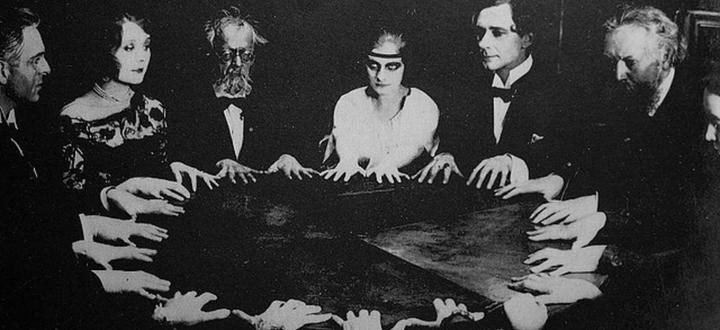
- DECONSTRUCTION IS AMERICA 3.3
–Deconstruction aligns itself with market society, with a universal and impossible commerce. Derrida is never more appealingly stringent than when trying to devise an action wholly outside the exchange relation, which would require as its occasion an object beyond the commodity form. An act for which you get nothing in return: giving is what we call that, except let’s take it seriously for once. “Nothing in return” means we can’t be exchanging gifts, not even on a delay, so Christmas presents won’t count, and neither will birthday packages, since the buttercup yellow stand mixer I present to you in February will come back to me as a vintage tweed overcoat seven months later. If I am really giving something, I can’t expect a counter-gift as recompense, but then I can’t expect anything else either: neither gratitude, certainly, nor a favor, nor the admiration of onlookers. Better, then, that I give the gift anonymously, since anonymity will make me hard to repay, though there remains the risk that I might, in my role as secret giver, bask in the diffuse wonder and room-searching thankfulness of the one opening the parcel, so better still that I not be there for the giving, even incognito (because the other’s confused smile will feel to me like compensation, and if there’s compensation, then—no gift). Even in this last scenario, of course, I might tickle myself by imagining the delight felt by the beneficiary of my shrouded largesse, so better if that person doesn’t even know it to be a gift. It is only by disguising the gift as something other than what it is that I cease to impose the obligation of gratitude. A gift stops being a gift when it can be named as such. Only the non-gift is a gift. But then the last remaining problem is that I will know it to be a gift even so, and this is a problem because I am bound to congratulate myself for having pulled off this feat of generosity. The satisfaction I take in my ethical handiwork will be my last remaining compensation, and once again, the gift will vanish. It is not enough, therefore, that the other not know the gift to be a gift. I can’t know it either. That’s a gift, the only gift: an object given by someone who doesn’t know herself to be a donor to someone who doesn’t know himself to be a recipient.[i]
It’s a remarkable argument and all the prompt one needs to recall the several passages across his corpus where Derrida seems to lead deconstruction outside of the marketplace. One thinks of the splendid, stinging attack on copyright at the beginning of Limited Inc—an attack, that is, on writing as personal possession and saleable article, for which Derrida means to substitute a theory of collective authorship and the text as commons. In the same vein, there’s this, from Monolingualism of the Other: “But who exactly possesses [language]? And whom does it possess? Is language in possession, ever a possessing or possessed possession … like a piece of personal property?”[ii] Language resists all efforts to treat it as one’s own. It can’t be in the least surprising, then, that literature is Derrida’s one plausible candidate for the impossible and utopian gift, perhaps its only real-world incarnation. Ecriture “surpasses the phantasm of return and marks the death of the signatory or the non-return of the legacy, the non-benefit, therefore a certain condition of the gift—in the writing itself.”[iii]
The only plausible candidate? Maybe that isn’t so clear. Empirically, this claim is perhaps a bit silly. The rigorism that otherwise characterizes Derrida’s argument about the gift—the moral severity that allows him to say that no gift is really a gift—has now disappeared, since nearly all writers (all writers?) do expect and get a return for their writing: payment, status, teaching jobs, tenure, praise, fans, although perhaps we can make Derrida’s argument more specific: When the text gets disseminated, some of the encounters it generates will have the character of the impossible—will be gifts, maybe the only gifts—via the people who read me that I don’t know and didn’t even foresee and who conversely know nothing about me, who never reimburse or even talk back to me. With any luck, they will read a copy of my book without dust jacket or title page, meaning: They won’t even be able to praise me by name, to cite me approvingly or raise my reputation with third parties.
Such is at least one way of filling in Derrida’s argument. The problem with this, however, is that by the time I imagine someone finding my book without my name on it, I am no longer conceiving of myself as engaged in a repeatable practice. I am headed back, rather, to the impossible and the utopian—not real literature as the realization of the impossible gift, but an improbably anonymous literature as the non-realization of the impossible gift. At the very least, Derrida has to abstract these fleeting and hypothetical encounters from out of an otherwise mundane culture of print, publishing, and literacy that has compensation and exchange built into it at multiple levels. But then perhaps the problem is equally that he has not done nearly enough to abstract writing-as-gift from ordinary print culture. I just wrote that the text can begin to function as a gift only once disseminated, and the primary vector of such dissemination in any society that we have known is the print marketplace. Anyone wanting to think concretely about deconstruction will need experimentally to excise the word “dissemination” every time that it appears in Derrida’s writing and silently substitute the word “distribution,” which is its unexcitingly commercial equivalent. Even the gift arrives mostly via warehousing middlemen and trans-Pacific shipping containers.
It is from out of materials like these last that Derrida builds one of the screwiest arguments in the annals of critical theory, which is nothing less than an Adornian defense of global capitalism. Here’s how that works. We’ll need first to hold in mind the point just made. Derrida’s account of dissemination has always worked best within the literary marketplace, though it does not strictly presuppose it, since the mere technology of writing is enough to ensure the unpredictable survival and circulation of texts. All the same, dissemination kicks into high gear—is realized to some higher degree—in the marketplace. Consider almost any book now sitting on your desk and you’ll be forced to conclude that it was the marketplace that did most of the work disseminating it. The book-as-commodity almost certainly traveled further than it did in its aftermarket existence as possession or shared good. To that extent, dissemination always works best as an argument about the print commodity. And yet Derrida sometimes takes himself to be talking about gifts, objects that are beyond exchange, which gives us the following puzzle: If the text is a paradigm for the gift, and the disseminated text is also paradigmatically a commodity, then gift and commodity have collapsed back into each other. Derrida’s perfect gift-and-non-commodity comes to us in the form of its opposite.
At the end of Given Time, the first of his two gift books, Derrida steps forward to argue this point without camouflage. People like Aristotle want to regulate trade in the name of householding, but Derrida isn’t having it, and this on the anti-domestic grounds that we often associate with queer militancy: because the home is a closed space and hearth-warmed penitentiary and to that extent immoral. The home is the very paradigm of identity-thought—you can find Adorno and sundry others arguing the same case. The ethics of deconstruction therefore requires that we not have homes or at least that we leave our homes unguarded, and if we are to do this, then we will have to promise not to pursue Athenian oeconomy, which supports an old and paternalist fantasy about well-governed homesteads. Here’s Derrida: “Nothing … can happen in the family … in the sealed enclosure, which is moreover unimaginable, of the restricted, absolutely restricted economy.”[iv] So we need an alternative, an open house, one name for which is hospitality.
Its other name, according to Derrida, is accumulation. The way to bid the world welcome—to practice non-identity or what used to be called the freedom of the house—is to reject Aristotle’s preferred option (thrift, careful expenditure, housewifery for men) and embrace the alternative he has discarded, which is the aggressive pursuit of wealth, Greek chresmatics or getting rich, which will transform your hitherto tedious dwelling into one more permeable node in the planetary circulation of goods. Derrida, this is all to say, concludes one of his major books by arguing that receptivity to the other requires global trade. “As soon as there is monetary sign … the oikos is opened…. This is at the same time its orginary ruin and the chance for any kind of hospitality. … the chance for the gift itself.”[v] Derrida’s chief candidate for the role of non-commodity is thus a certain type of commodity, the kind from Brazil or Vietnam, circulating anonymously, untethered from its origins—just like text, which for deconstruction has paradigmatically been commercialized text anyway. Firm judgments, national economies, and many types of interpretation are closed, hence malign. Open are 1) aporia or the skeptical suspension of judgment; 2) global markets; and 3) poetry and poetic principles of literary interpretation, of a kind that can be brought to bear even upon narrative.
At this point, there lights up a long sequence of passages, from across three decades of writing, in which Derrida aligns deconstruction with markets or money or the commodity. I’ll point to three of them briefly. A fourth demands closer consideration.
1. Platonists often argue that there need to be wise people who can make judgments concerning good and bad, benefit and harm—people, that is, who can discern the ethical implications and political effects of proposed innovations. That’s an argument that Derrida unsurprisingly rejects, though what is nonetheless easy to overlook is Derrida’s active recasting of Plato’s position into an anachronistically commercial language: “it is the King who will give [writing] its value, who will set the price of what, in the act of receiving, he constitutes or institutes.”[vi] That sentence, it has to be said, is rather strange, because there is very little to suggest an economic reading in the passage from Plato to which Derrida is responding. In other words, Derrida has had to introduce the economic register, which arrives in the form of an accusation: The king is the one who, believing himself possessed of moral insight, makes ethico-political judgments, which are akin to price-fixing. And having framed his complaint in pecuniary terms, Derrida has given himself no choice but to produce an alternative that will also work in such terms, a policy that is at once textual and economic. The emancipated and mobile writing that he theorizes in “Plato’s Pharmacy” is thus a textuality that has slipped loose from commercial controls, a liberalized écriture around which buyers and sellers will without supervision set the terms for what is good and bad. Or rather: Literature is itself the low-tariff marketplace of language, in which language circulates freely, without monopolies or trade restrictions.
2. The ghost is the textbook Derridean term, the present absence, the spirit in quasi-corporeal form, the body-spirit, outside of categories, outside the regime of knowledge or discourse—something we cannot claim in the usual fashion to name or know: “One does not know [the ghost]: not out of ignorance, but because this non-object, this non-present present, this being there of an absent or departed one no longer belongs to knowledge. … this Thing that is not a thing.”[vii] Very early in Specters of Marx, during one of that book’s first bits of free association, Derrida makes clear that the commodity is, if we follow Marx, ghost-like in just this sense: a non-sensuous sensuous thing. And Derrida is right about Marx; Capital, Volume One famously speaks of “the phantomlike objectivity of the commodity.”[viii] But then if Derrida is sticking up for the ghost as the disruptive and redemptively unclassifiable term, if, that is, we are to prefer spectral versions of things to their mundanely tangible and daylit forms, and if commodities are apparitional in the relevant sense, then Derrida has got to be sticking up for the latter, too—for commodities—and deconstruction’s putative reconciliation with Marxism shows itself, not for the last time, to be happier inside markets than outside of them.
3. In the great lecture on “Differance,” Derrida says he finds it striking that the word difference, in French, never actually means “deferral” (even though the underlying verb can mean “defer”). Nor does difference mean polemos, as in “difference of opinion,” an English formulation that doesn’t come readily to French speakers. That is the situation that Derrida means to remedy by proposing that we swap in an -a- for that second -e-. Differance will mean all three at once: dissimilarity, postponement, and conflict. Later in the lecture, he revisits the second on the list, noting that the economic meaning of “deferral” is especially important to him. Language has the structure of an economic delay: delayed satisfaction, the deferred realization of profit on an investment, and so on. Deconstruction, one is startled to realize, is a cousin to the Marshmallow Test. We should pause here to note that deferral-as-economic-delay is a usage he might have come across in French anthropology. The verb “defer” shows up with this meaning in Claude Lévi-Strauss, for instance, whom we know Derrida read closely and who in turn had borrowed it from an important monograph on pre-modern Chinese kinship. Lévi-Strauss had been eager to distinguish between different types of exchange, and especially between:
-first, one-off trades, two-term swaps that have at least some of the characteristics of bartering, and…
-second, the kind of extended chains and complicated, interlacing transactions common to market societies and many societies of the gift.
The first Lévi-Strauss and the sinologist called chassé-croisé, which means “crossover” or “back-and-forth,” though it also a move in French country-dancing, which tempts one to translate it as “do-si-do.” The second he called échanges differés.[ix] Or rather, that’s what Ganet, Lévi-Strauss’s source, had called it: “deferred exchange.” Lévi-Strauss preferred to call it “generalized” as opposed to “restricted” exchange. And this brings us back, via a different route, to the final pages of Given Time. Differance absorbs as one of its meanings the unrestricted economy, the trade that only ever opens up onto another trade—exchange without end.
4. The paper of Derrida’s that most often gets misread is probably “White Mythology.” Again and again, one comes across experts claiming that the main argument of that essay is that philosophy cannot cleanse itself of metaphor. It is hard to pin this misunderstanding on Derrida, who is clearer than usual about what he’s arguing: He begins the essay by saying that this notion—no non-metaphorical philosophy!—is the point that everyone knows already and then spends the remainder of his time making the opposite case, which is that the entire language of metaphor is metaphysical, that by talking about metaphor rather than about concepts one is not leaving philosophy behind. In other words, the essay’s takeaway is that the literary types should stop gloating, that their preferred (putatively non-philosophical) approach to language does not exempt them from the European intellect’s contaminating legacies. Pensée sauvage—mind in the wild, thinking outside the philosophical West—is what’s at stake in that essay, only not in the way that a first-time reader might think. It’s precisely the position that Derrida is out to defeat, though his named targets are not so much anthropologists as the historical philologists who thought you could peel away all the vernacular and philosophical abstractions in language until you reached the original, indigenous names for things—the first terms and positivities. He is claiming that this can’t be done—that there is no logic of the concrete to be accessed by tracing abstractions back to the metaphors, flinty and palpable, from which these were originally derived; that thinking tangibly has never been an option; that there has only ever been abstraction and this from word one.
Granted, before readers can get to this argument, they will have to make it through a confetti-spray of puns and mad troping. The essay’s very first post-titular word is “Exergue,” appearing above the first paragraph, as a chapter heading, and meaning several things at once.[x] It’s a French word dating to the seventeenth century, a bit of concocted pseudo-Greek approximating the phrase hors d’oeuvre, “outside the work,” which means that we can take it, if we like, as meaning “preface” or even “starter.” This isn’t the word’s definition of record, however. A big English dictionary will tell you that “exergue” is a term from numismatics, in which capacity, as a piece of hobbyists’ jargon, it means the small text printed caption-like on a coin—“inscription,” then—except among English coin-collectors the meaning shifted early on to mean not the inscription itself but the space, beneath the liberty torch or emperor’s head, into which the inscription got stamped. “Exergue” thus means either words on coins or the coin itself understood as a space for writing.
There are now two arguments we have to be able to hold together: first, that language is never concrete, not even when pre-philosophical, if that word is even allowed; and second, that we can usefully think about writing in the context of money or perhaps that we would do well to think of writing as money-like. Words cannot be concrete because they have to be able to circulate; they have to be usable in multiple contexts—this is the sense in which they are like coins. Observations that Derrida makes first about florins and guilders he therefore invites us to transfer over to language: Old coins were vulnerable to wear-and-tear; we should be thinking about the slow effacement, through regular handling, of design and motto, their gradual reduction back to metal, bare and un-signifying. Derrida’s point is that you can’t profit from a circulating something—a common noun or Mercury dime—if you’re not prepared to risk a degree of abstraction, and not just a one-time abstraction, but an ongoing slide into higher abstraction. Rather than trying to recover the concrete terms that supposedly lie sedimented behind our philosophical concepts, we should commit ourselves to this course of de-specification, which is the fate of all much-handled things. This is perhaps the baldest instance of Derrida’s characteristic resolve to solve philosophical problems by shifting thought to higher levels of generality. It’s just that the image he produces to telegraph that solution is especially striking here: Thinking does not begin in concretion and lapse into empty form. It begins in abstraction and becomes even more abstract, and the paradigm for this process, once completed, is a ground-away coin, a denarius whose symbols and national designations have been effaced—a kind of global hyper-currency, in other words, not backed by any metropolitan treasury, ministerially unsigned, undenominated—an impossible coin, you might say, because no transnational currency currently exists, until you realize that all that Derrida is describing is raw specie, undifferentiated bullion—an ingot.[xi]
It’s important to be clear about this: For Derrida, such un-differentiation is the utopian condition of both money and language, because, at least as a thought experiment, it would allow for maximal and frictionless circulation, maximal delocalization, without borders or translators or currency-exchange kiosks. The philologists think that they can trace the word nous back to something that a goatherd once witnessed in the northern Peloponnesus, and Derrida’s response is to claim that language has never been aboriginal in this way—that it is, indeed, better for us that it never be aboriginal, localized, non-commercial. This last idea should help us understand why Derrida calls the essay “White Mythology.” A century ago, Anatole France, arguing in the indigenist-philological mode that Derrida rejects, asked his readers to think of philosophy as mythos alienated from itself, a system of thought with mythic origins that, however, did not know itself to be mythical, burying its underlying concretion in layer upon layer of false ideation. In a sense, that notion is a way of denouncing philosophy, and yet it also posits a mostly unrecognized continuity between myth and school-wisdom, suggesting, indeed, that something telluric remains intact even in the loftiest of modern thought-systems. A talented philologist should be able to pick up Fichte or Malebranche and make him speak myth again, by tracing the philosopher’s attenuated concepts back to their primeval and non-philosophical roots. If, having done this, we then return to the Treatise on Ethics as written, it will look to us not like great philosophy, but rather like “anemic mythology”—that’s how France put it.[xii] Hence Derrida’s title: It is Anatole France’s philosophy-as-blood-sick-folklore that the essay renames “white mythology,” and it is that latter concept that Derrida means to vindicate, because blankness is deconstruction’s path to redemption. This cannot be said often enough. The essay “White Mythology” was written in defense of its eponym, though even here what matters to Derrida is not so much the “mythology,” which is the word he took over from Anatole France, as the “white,” which is the word he introduced of his own volition. Onwards, says the Derridean … no going back … forwards … into the whiteness. Mush.
[i] Derrida, Given Time: 1. Counterfeit Money (1991), translated by Peggy Kamuf (Chicago: University of Chicago, 1992).
[ii] Derrida, Limited Inc, translated by Samuel Weber (Evanston, IL: Northwestern University Press, 1988), p. 29-31; Monolingualism of the Other, p. 17.
[iii] Given Time, p. 100.
[iv] ibid., p. 159.
[v] ibid., p. 158.
[vi] “Plato’s Pharmacy,” p. 78.
[vii] “Specters,” p. 6.
[viii] Marx, Capital, Volume 1 (1867), translated by Ben Fowkes (New York: Vintage, 1977), p. 128.
[ix] Claude Lévi-Strauss, The Elementary Structures of Kinship (1949), translated by James Bell and John con Sturmer (Boston: Beacon Press, 1969), p. 312.
[x] “White Mythology,” p. 209.
[xi] ibid, p. 210.
[xii] Anatole France, The Garden of Epicurus, translated by Alfred Allinson (New York: Dodd, Mead, 1923), p. 214. Derrida quotes—or misquotes—France at p. 213.










